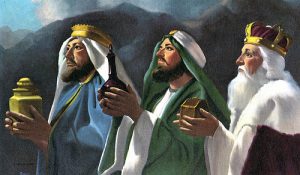 With the inauguration around the corner and the celebration of the three wise men in the rear-view mirror, I thought it might be fun to take a deeper look into an ancient inauguration. It’s an interesting story that goes the whole way back to the story of Daniel, somewhere around 580 BC.
With the inauguration around the corner and the celebration of the three wise men in the rear-view mirror, I thought it might be fun to take a deeper look into an ancient inauguration. It’s an interesting story that goes the whole way back to the story of Daniel, somewhere around 580 BC.
Daniel was a very bright and gifted young man when King Nebuchadnezzar of Babylon attacked Jerusalem and to took Daniel, along with a host of other Jews, into Babylonian exile. There is a lot that can be said about Nebuchadnezzar that isn’t so good, but he had some forward-thinking ideas about how to integrate a conquered people into Babylonian society. He sought out the most gifted captives to educate in Babylonian ways—making them members of the court and his advisors. Even among the cream of the crop, Daniel stood above the other the captives. He and Nebuchadnezzar developed a close relationship, and Daniel attained a lot of power in the Babylonian Empire.
As the Babylonians were about to fall to Cyrus of the Medo-Persian Empire, Daniel remembered the words of the prophet Isaiah written a century and a half before. In short, Isaiah called Cyrus by name and told of the method by which he would conquer Babylon. Once Babylon had fallen, Daniel presented the prophecies to Cyrus, who was immediately impressed with both Daniel and the God he served. For that reason, he placed Daniel over the Medo-Persian priest cast—and this is where things get really interesting.
The Medo-Persian priests were a very powerful part of that society. Not only did they guide the religion of the empire, but they also were responsible for anointing the empire’s rulers. In short, if the priests didn’t declare a man to be ruler, his power base eroded—no anointing, no inauguration. This caste of priests didn’t like it much that they were ruled by a Hebrew, and in fact tried to orchestrate Daniel’s death (remember the lion den?). But God protected Daniel and gave him astounding prophecies about the coming of the Messiah. One of the most significant is a prophecy that Messiah would come 173,880 days after the pronouncement to restore and rebuild Jerusalem. On that exact day, Jesus presented Himself to the Jewish priests on a day that we now celebrate as Palm Sunday.
Well, the Medo-Persian Empire fell to the Greeks, and then the Greeks to the Romans. Israel at the time of the Roman Empire was an outlaw outpost. Beyond to the east were the Parthians, who were descended from the Persian side of the Medo-Persian Empire. They retained their priest-class and its special powers of anointing the king. These are the guys that came to anoint Baby Jesus king.
Put aside preconceived, Christmas-card images of three lonely wise men with three paltry gifts. These guys were powerful. They traveled in great caravans, and their ability to stir things up on the border made them especially feared by Rome. The gospels tell us all of Jerusalem was astir when they went to see Herod to inquire about the newborn king. And Herod was having a code brown moment himself. He was an Edomite (historical enemy of the Jews) who the Romans placed in the position of ruler in Israel by the Romans. The ancient Jewish ties to the Babylonian-Medo-Persian history made the Jews more likely to align themselves with the Parthians than their Latin conquerors. When this caravan of kingmakers rode into Jerusalem, Herod understood that he would scarcely be able to retain control over the area if the Parthians chose another king.
But they didn’t go to someone who would rise up to contest Herod’s power. Instead of some warlord who would provide Israel with political redemption, the Parthians went to a small baby who in about thirty years would fulfill Daniel’s prophecies of Messiah who would provide spiritual redemption. The Parthians “inaugurated” Him. But here’s a question: How could they have known about Him other than their holding to the prophecies of a Jewish man who had led their ranks almost 600 years before?
I love the Bible because it isn’t some piece of old literature! When read carefully, it shows how the very will of God works itself throughout history and points the way to the only King that really matters.
Don’t get too bent out of shape one way or the other about the inauguration this week. Inaugurations come and go, but in the scheme of things only one King stands.


 RSS - Posts
RSS - Posts